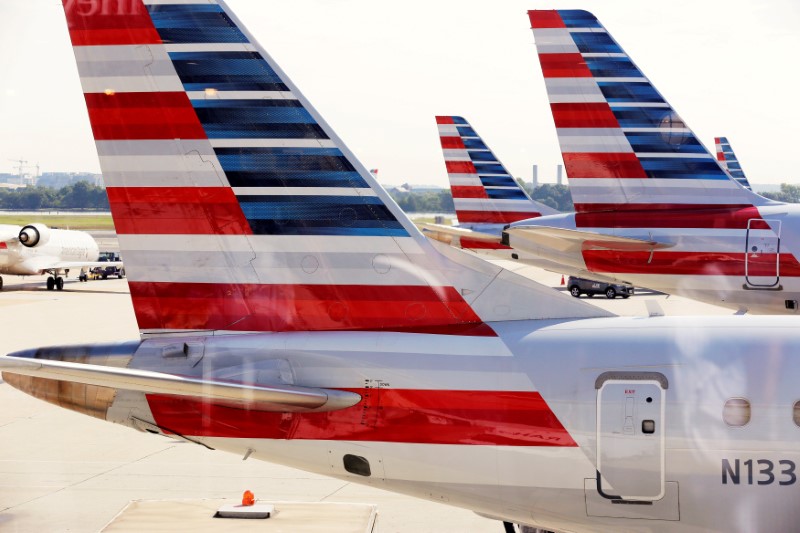By Alexander Cornwell
(Reuters) - American Airlines' chief executive said on Thursday the company is not "particularly excited" about Qatar Airway's interest in buying up to 10 percent of the U.S. carrier's shares, in a letter to employees following disclosure of the state-owned Gulf airline's overture.
The move by Qatar Airways to buy a stake in American would expand the Gulf carrier's investments into North America against a turbulent diplomatic and global competitive backdrop.
Qatar and four Arab nations are embroiled in the region's worst diplomatic crisis in years, and Qatar had asked the United Nations' aviation agency to intervene in an airspace rights dispute.
Separately, American Airlines Group Inc (O:AAL), United Continental Holdings Inc (N:UAL), and Delta Air Lines (N:DAL) have pressed the U.S. government to take action to curb U.S. flights by Qatar Airways and rival Gulf carriers Emirates Airline [EMIRA.UL] and Etihad Airways. The U.S. carriers charge that their Gulf rivals have received billions of dollars in unfair state subsidies, allegations the Gulf carriers deny.
Parker, in his letter, promised to continue American's "full court press ... to stand up to companies that are illegally subsidized by their governments." The CEO also said he found Qatar Airways' proposed investment "puzzling given our extremely public stance on the illegal subsidies that Qatar, Emirates and Etihad have all received over the years from their governments."
The potential investment is worth at least $808 million, American said in a regulatory filing on Thursday, and would put Qatar Airway's stake on par with Warren Buffet's Berkshire Hathaway (N:BRKa), which holds a 10 percent stake in the airline.
Shares of American Airlines rose more than five percent in pre-market trade after it disclosed the potential investment. The stock was up 1 percent at $48.88 in afternoon trade.
Qatar Airways said in a statement that it sees a "strong investment opportunity" in American and that it "intends to build a passive position in the company with no involvement in management, operations or governance."
"Qatar Airways plans to make an initial investment of up to 4.75 percent. Qatar Airways will not exceed 4.75 percent without prior consent of the American Airlines board. Qatar Airways will make all necessary regulatory filings at the appropriate time."
American, in its filing, noted potential obstacles to Qatar's plan. American said its rules prohibit "anyone from acquiring 4.75 percent or more of the company's outstanding stock without advance approval from the board," and said it had received no request from Qatar for such approval. Further, American said, "there are foreign ownership laws that limit the total percentage of foreign voting interest to 24.9 percent."
The stake in American Airlines by Qatar Airways would add to its investment portfolio. The Middle East's second biggest airline also owns 20 percent of British Airways-owner International Airlines Group (LON:ICAG) (IAG) and 10 percent of South America's LATAM.
Qatar Airways Chief Executive Akbar al-Baker has said the investments were purely financial, though he has looked for opportunities to cut costs or expand service with the oneworld alliance airlines in which it owns stakes.
Qatar Airways, American Airlines, IAG's British Airways, Iberia and LATAM, are all members of the oneworld airline alliance.
British Airways and Qatar Airways have a revenue sharing partnership between their respective hubs in Doha and London, and Qatar Airways plans to launch flights to LATAM's base in Santiago, Chile.
"The U.S. market is strategically important to Qatar Airways and this would strengthen their ability to feed at the U.S. end," independent aviation consultant John Strickland told Reuters. "However, if it does go ahead it would not give them automatic antitrust immunity. That would have to be negotiated separately."
The crisis in the Gulf has seen Saudi Arabia, the United Arab Emirates, Bahrain and Egypt close their airspace to Qatar Airways, forcing it to cut flights to those countries, fly longer routes and thereby adding costs.
Al-Baker, who has been highly critical of the blocking of airspace, has said Qatar Airways would use the aircraft used to fly to those countries for fast-track expansion plans elsewhere.
The dispute among the Arab states is a diplomatic test for the United States, which is an ally of the main parties in the conflict.

In Washington's strongest language on the dispute this week, the U.S. State Department questioned the motives of Saudi Arabia and the UAE in announcing their boycott of Qatar. U.S. President Donald Trump, however, has taken a tougher stance on Qatar, accusing it of being a "high level" sponsor of terrorism, but he has also offered help to the parties in the dispute to resolve their differences.